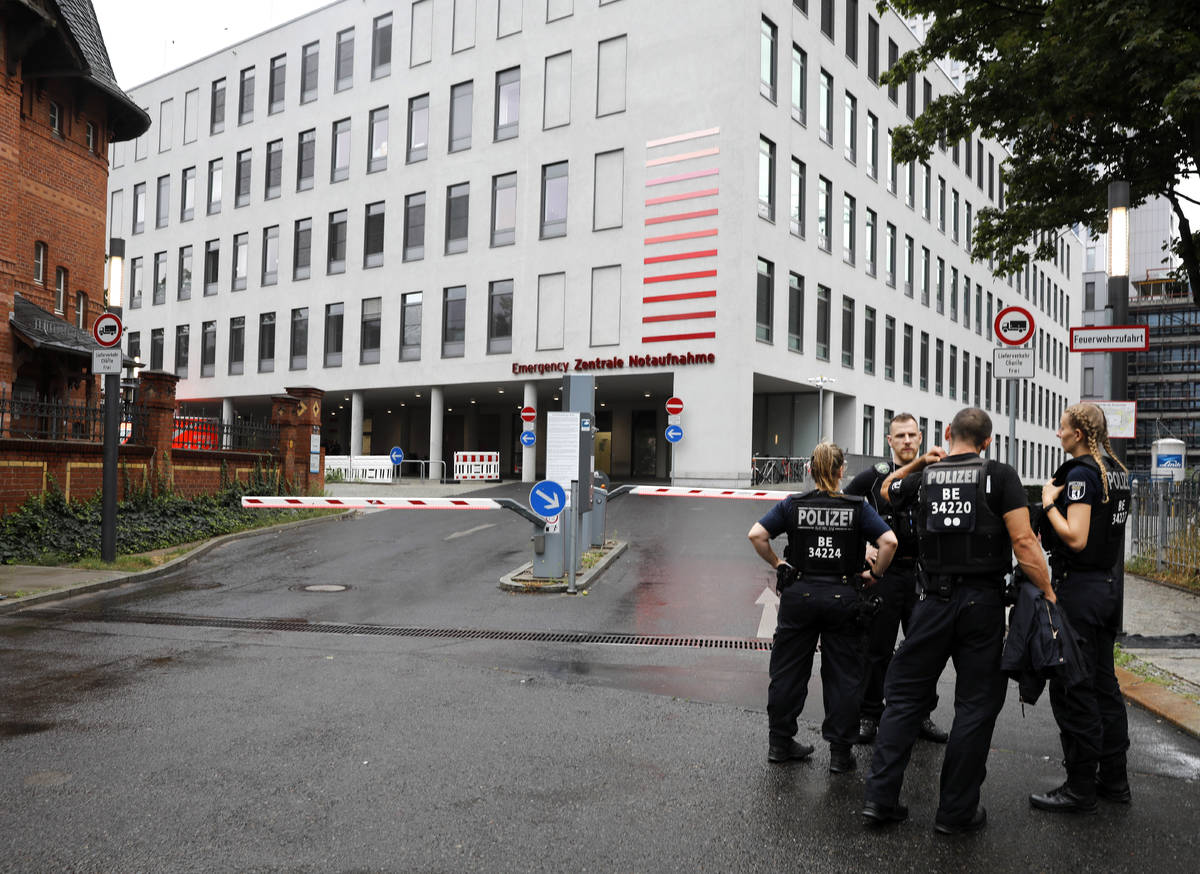Comatose Russian dissident stable upon arrival in Germany
BERLIN — Russian dissident Alexei Navalny, in a coma after a suspected poisoning, was flown from Siberia on Saturday to Berlin for treatment by specialists at the German capital’s main hospital.
After touching down shortly before 9 a.m. at a special area of the capital’s Tegel airport used for government and military flights, Navalny was taken by ambulance to the downtown campus of Berlin’s Charité hospital.
“He survived the flight and he’s stable,” Jaka Bizilj, of the German organization Cinema For Peace, which organized the flight, told The Associated Press.
The hospital later issued a statement saying extensive tests were being carried out on Navalny, and doctors would not comment on his illness or treatment until those were completed.
Navalny, a politician and corruption investigator who is one of Russian President Vladimir Putin’s fiercest critics, was admitted to an intensive care unit in the Siberian city of Omsk on Thursday. His supporters believe that tea he drank was laced with poison — and that the Kremlin is behind both his illness and the delay in transferring him to Germany.
The Omsk regional health ministry on Saturday issued a statement saying that, so far, tests done on Navalny while he was there had found no poisons.
“Tests were immediately taken for the presence of toxic substances in the body,” the ministry said. “Already today we can say that oxybutyrates, barbiturates, strychnine, convulsive or synthetic poisons have not been found. Alcohol and caffeine were found in the urine.”
Bizilj, a film producer, said he was not qualified to say how Navalny fell ill, but that “it’s obvious that something terrible happened.”
“He’s a healthy strong man with a good constitution — the night before the attack he was swimming in a river,” Bizilj said.
“Obviously this was an attack on his life … a healthy man suddenly was in life danger and maybe could have died and maybe he can still die.”
When German specialists arrived aboard a plane equipped with advanced medical equipment Friday morning at his family’s behest, Navalny’s physicians in Omsk initially said he was too unstable to move.
Navalny’s supporters denounced that as a ploy by authorities to stall until any poison in his system would no longer be traceable. The Omsk medical team relented only after a charity that had organized the medevac plane revealed that the German doctors examined the politician and said he was fit to be transported.
Deputy chief doctor of the Omsk hospital Anatoly Kalinichenko then told reporters that Navalny’s condition had stabilized and that physicians “didn’t mind” transferring the politician, given that his relatives were willing “to take on the risks.”
The Kremlin denied that resistance to the transfer was political, with spokesman Dmitry Peskov saying that it was purely a medical decision. However, the reversal came as international pressure on Russia’s leadership mounted.
It would not be the first time a prominent, outspoken Russian was targeted in such a way — or the first time the Kremlin was accused of being behind it.
On Thursday, leaders of France and Germany said the two countries were ready to offer Navalny and his family any and all assistance and insisted on an investigation into what happened.
The most prominent member of Russia’s opposition, Navalny campaigned to challenge Putin in the 2018 presidential election but was barred from running. Since then, he has been promoting opposition candidates in regional elections, challenging members of the ruling party, United Russia.
His Foundation for Fighting Corruption has been exposing graft among government officials, including some at the highest level. But he had to shut the foundation last month after a financially devastating lawsuit from a businessman with close ties to the Kremlin.
Navalny fell ill on a flight back to Moscow from Siberia on Thursday and was taken to the hospital after the plane made an emergency landing. His team made arrangements to transfer him to Charité, a clinic in Berlin that has a history of treating famous foreign leaders and dissidents.
While his supporters and family members continue to insist that Navalny was poisoned, doctors in Omsk denied that and put forward another theory.
The hospital’s chief doctor, Alexander Murakhovsky, said in a video published by Omsk news outlet NGS55 that a metabolic disorder was the most likely diagnosis and that a drop in blood sugar may have caused Navalny to lose consciousness.
Another doctor with ties to the politician, Dr. Anastasia Vasilyeva, said that diagnosing Navalny with a metabolic disorder says nothing about what may have caused it — it could still have been the result of a poisoning.
Dr. Yaroslav Ashikhmin, who has been Navalny’s doctor since 2013, said the politician has always been in good health, regularly went for medical checkups and didn’t have any underlying illnesses that could have triggered his condition.
Western toxicology experts expressed doubts that a poisoning could have been ruled out so quickly.
“It takes a while to rule things out. And particularly if something is highly toxic — it will be there in very low concentrations, and many screening tests would just not pick that substance up,” said Alastair Hay, an emeritus professor and toxicology expert from the school of medicine at the University of Leeds.
Like many other opposition politicians in Russia, Navalny has been frequently detained by law enforcement and harassed by pro-Kremlin groups. In 2017, he was attacked by several men who threw antiseptic in his face, damaging an eye.
Last year, Navalny was rushed to a hospital from jail where he was serving a sentence on charges of violating protest regulations. His team also suspected poisoning then. Doctors said he had a severe allergic reaction and sent him back to detention the following day.


























